- Home
- Nathan Lowell
Home Run Page 8
Home Run Read online
Page 8
The closer they got, the smaller the chance of running into chunks of fast-moving debris. Whatever had happened had sent pieces of the station flying in all directions, some of it at high rates of speed. The expanding cloud had been traveling for over a week, leaving the actual site relatively clear, other than a disabled Barbell spinning slowly on its center of mass. As time went on, the cloud would attenuate but until then, the loose pieces of metal and rock made the approach from outside the Burleson limit a risky proposition.
“Rock Ripper, Peregrine. Can you tell us what happened? Over.”
After a pause that ran longer than necessary, the speaker crackled. “Peregrine, Rock Ripper. Not exactly. We were coming back from the C-belt with a load of ore for the grinder here. We were about three light-seconds out when the station lit up and then disappeared from long-range scan. I’ve never seen anything like it. I was on the bridge getting ready to relieve the first mate and it was like a strobe went off. I wasn’t looking in that direction but it lit up everything on the bridge like it was daylight for a split second and then went dark. The station didn’t show on long range. Only a smudge where it should have been. A couple of stans later we started picking up debris on short range and rolled the ship so anything coming at us would hit the ore holds instead of the ship. We got punched a couple of times. Don’t know how badly but bad enough. Eventually we got inside the debris field and hove to about where the station should have been. That was ten, eleven days ago and I don’t mind saying, we were relieved to see somebody show up on long range. Over.”
“Roger, Rock Ripper. What’s your status on fuel, food, water, and gases?”
“Peregrine, Rock Ripper. We’re low on maneuvering fuel. Got maybe half a tank of main thruster. Got water for a couple of weeks and about the same amount of food. Longer if we start rationing. Over.”
“Rock Ripper, Peregrine. My advice, start a rationing protocol. We have some supplies but we’re going to need to call in some major logistical support just to keep everybody breathing. Over.” Zoya sat back from her console and looked around the cockpit. “Well? Catastrophic fusactor failure?”
Bean nodded. “What else could it have been?”
Something tickled the back of Natalya’s brain. “That doesn’t exactly sit right with me but I can’t think of what else could’ve done that.”
“The question is how do we cope with this? Those people are going to start dying pretty soon. We need to get a message back to Big Rock now and get them going on food, fuel, scrubber cartridges, and water,” Zoya said.
“We need a central location we can keep supplied,” Natalya said. “Having a rendezvous point where we can stage incoming stores, a docking location for distribution, and a safe harbor for those crews running too close to the edge would go a long way. How many crew on a barge?”
Zoya shrugged. “Minimum of four, maximum of eight, depending on the skipper’s preference.” She clicked on the comms array. “Rock Ripper, Peregrine. What’s your head count? Over.”
“Peregrine, Rock Ripper. We’ve got six. Over.”
“Roger, Rock Ripper. Peregrine, out.”
Zoya looked at Natalya.
“We need to check out this other hull,” Natalya said pointing to the disabled Barbell on short-range scan. “There could be people alive there.”
“I’m on it,” Zoya said. “We’re sliding over that way now. We should have a visual soon.”
“What do we do if there are? People there, I mean?” Bean asked.
Natalya sighed. “They didn’t reply to a hail, but it might just mean they don’t have access to the bridge. It could also mean there’s nobody left who knows how to access the comms systems. It depends on who was on the bridge when the bottle blew.”
“What are you thinking?” Zoya asked.
“Well, it’s almost dead in space but spinning on its center of mass,” Natalya said. “That’s consistent with a ship on final approach easing into dock.”
“Or just pulling back,” Zoya said.
Natalya nodded. “Or that. Point is, most of the officers would have been on the bridge along with the senior ratings. A sudden direct hit on the bridge would have taken them all out and set the ship spinning.”
“Why wouldn’t it be moving away with the rest of the debris?” Bean asked.
“That’s a lot of mass,” Natalya said. “Depending on what hit it and where, there might not have been enough transfer of energy to do more than spin the ship.”
“Think of a pea hitting a cubic meter of steel,” Zoya said. “Even moving at a high rate of speed, the pea’s mass relative to the steel isn’t going to do much more than tickle the steel.”
Bean said, “Got it. That Barbell must have significant mass.”
“Close to three hundred metric kilotons compared to a broken-off piece of the station,” Zoya said.
“Like the docking ring,” Natalya said. “If they were close to the station and heading inbound, their momentum would have been huge compared to a chunk of debris the size of a docking ring.”
“There’s another consideration,” Zoya said. “EMP and radiation.”
Natalya frowned as she worked through the implications in her head. “EMP, sure. That might have fried the electronics on the Barbell, but ship fusactors are pretty well tamped to keep radiation damage low.”
Zoya nodded. “The company tends to use standard ship fusactors on their stations rather than building custom units in situ. Big Rock has three of them for just that reason. They’re also rigged near the surface of the rock with a shaped charge on an automatic trigger to blow them into space if they get too hot.”
The proximity alarm pinged.
Zoya glanced at the short range, then yawed the ship to face the freighter. As they closed on the hull, the extent of the damage became clear. A chunk of the bow where the bridge should have been, starting just above the docking ring and extending aft almost to the spine, had been sheared off, leaving chunks of the ship’s ribs exposed. When Zoya turned on the outside floods, they saw right into the staterooms that would have been officer country.
The view was a punch in the gut and brought the terrible reality home to Natalya in a way that discussing the theoretical damage couldn’t match. Staring at the empty bunks and the grav trunks in their cubbies brought the human toll into focus.
“They still have power,” Bean said.
“How do you figure?” Zoya asked.
“The mattresses are still on the bunks.”
Natalya looked again. “Good catch. The gravtrunks have their own gravity but with that rotation, the mattresses would be floating.”
“I expect the decompression pulled the lighter items out but there’s not that much air under the mattress because the bunks are solid beneath them. Not enough Bernoulli to overcome the gravity and pull them up and out.”
“There are airtight doors all over that ship,” Zoya said. She skated the Peregrine around to look at the bridge again. “I can’t tell if the data closet has been compromised.”
“Even if it has, there’s an auxiliary aft and all the consoles can be shifted to be bridge consoles if you know the codes,” Natalya said. “Maneuvering is going to be tough with that many bow thrusters gone.”
Zoya nodded. “Doable if you’re careful with momentum, but she’s never going to jump out of here without replacing those Burleson emitters.”
“Wonder if she was coming in or leaving,” Natalya said.
“Does it matter?” Bean asked.
“Depends on what she has in her holds right now.” Natalya pursed her lips. “What’re our priorities here?”
“Reconnaissance, damage control, rebuilding,” Zoya said. “We need to get this information back to Big Rock.”
“Too bad the buoy’s offline,” Natalya said. “We could have used that.”
“We’ll have to jump out to find an active terminal,” Zoya said. “We don’t know how High Tortuga is going to handle this. They may need another request be
fore they’ll service it and we can’t request service while buoy’s down.”
“We’ve got to get relief for Rock Ripper pretty quick,” Natalya said.
“Well, the barges are good for at least a couple more weeks,” Zoya said. “Maybe a bit more depending on how well they manage resources. The question is how fast we can resupply and how we’re going to handle it.”
Natalya followed the reasoning. The calculation made her stomach sour.
“What’s the problem?” Bean asked. “Other than we don’t have the goods to distribute?”
“We have no station,” Natalya said. “Even if that hulk over there were full of food, we’d have no way to get the can off the ship. Even if we could, we have no way of getting the goods out of it and no way to get the goods onto the barges.”
Bean nodded. “So assume there’s a station. How would it work?”
“The ship would dock, a cargo handler would pull the inbound can and park it, another cargo handler would pull an outbound can from the marshaling yard and mount it to the ship. The ship would undock and go on its way.” Natalya felt the jolt of an idea like a physical blow. “Where’s the marshaling yard?” She started slapping keys and filtering out the noise caused by debris. Eventually the tell-tale oblongs of Barbell cans appeared on the short-range scan. “They’re a long way out.”
“Twenty-something kilometers. Probably have to be,” Zoya said. “Keeps them out of the way of the barges and haulers coming in from all directions.”
“So? With the marshaling yard, have we reduced the problem?” Bean asked.
“Possibly,” Natalya said. “We can at least unload a can from a ship. The next hurdle is getting into the can. They’re loaded through the end caps.”
“The marshalling yard should have that facility if it’s intact, but then there’s the problem of loading goods onto the barges,” Zoya said. “Solids like food will be relatively easy, if tedious, in Zero-G. Water? Gases? Those usually get pumped in but that’s accomplished through the station connections, not at the marshalling yard. We could freeze the water easily enough but presenting blocks of ice to a barge won’t be too much help. We don’t have either fuel or water at the moment.”
“Giving them ice they could melt for drinking water strikes me as being pretty helpful compared to dying of dehydration,” Bean said.
Zoya cocked her head. “You’re right. I’m too hung up on how it’s done to consider things we might do instead.”
“Reconstruction is going to be difficult without metal-forming technology,” Bean said. “We’ll need plates, girders, sealants. I have a welding kit in my tool box, but that’s not going to help much without pieces to weld together. And I’m only one guy. Rebuilding this will require a lot of help.”
“Cans,” Zoya said. “If we can find even one empty can, we can turn it into a habitat.”
Bean nodded. “Add a rudimentary airlock. It would work, but it will need a pump and the power to drive it.”
“Let’s contact that inbound freighter and see if we can convince her to take a message for us,” Natalya said.
“You trust them to send it?” Zoya asked.
“What choice do we have?” Natalya asked. “We need to get moving on finding out if there’s anybody left alive on that ship out here. In the short run, we can’t leave on the Peregrine yet. We don’t have any place to use as a base except the Peregrine, unless that ship has some livable volume left.”
“We could commandeer the inbound freighter,” Zoya said. “Life or death emergency.”
“Nobody out here to enforce it,” Natalya said. “They can just thumb their figurative noses at us and jump away.”
“True,” Zoya said. “Let’s see if there’s anybody home.” She nodded at the disabled Barbell.
“How are you going to do that?” Bean asked.
“Knock on the door,” Zoya said. She glanced at Natalya. “You wanna go or shall I?”
“I’ll go,” Natalya said. “You keep flying.”
Zoya nodded and Natalya went back to engineering to put on her softsuit.
Chapter 15
Smelter Seventeen:
2368, February 8
“This would be a lot easier with a thruster pack,” Natalya said, standing in the open lock and staring out at the stern of the Barbell.
“It’s not that far and you’ve got a lifeline,” Zoya said. “Do it just like the academy drills.”
“You telling me not to be a baby?”
Zoya laughed. “Think of it as gentle encouragement. We’re at zero delta-V. Whenever you’re ready.”
Natalya double-checked that the d-link on her lifeline had closed on the grab bar outside of the lock and that the line was free in space. She clipped herself to the line, tugging to make sure of the connection.
“Here I go.” She grabbed the bar on the outer door and swung out into space.
“I’m out.” She pulled herself around to face the stern lock on the Barbell. She knew it was only about ten meters away, but her gut kept arguing that she couldn’t jump that far. She flexed the toe of one boot and released her hold on the Peregrine. Her slow-motion leap took her to the Barbell in thirty heart-pounding seconds. Her gauntlet closed around the grab handle beside the lock and she released the breath she didn’t know she’d been holding.
“At the lock. Clipping on.” She threaded a second lifeline around the grab bar and clipped it off by snapping the link onto the line.
“Closing the loop.” She unclipped her original line and clipped that to the grab bar as well. “Secured. Knocking on the door.”
She reached out for the lock call button beside the door. The button lit up as she pressed it and went dark when she released it. “Positive response on the call button. Give me a thirty-second update, please.”
“Roger, thirty-second update.” Zoya’s calm voice helped steady her.
Natalya forced herself to look only at the lock and breathe slowly.
After about four breaths, Zoya said, “Thirty seconds.”
“No response yet,” Natalya said. “They may not be expecting company.”
After what seemed like a stan, Zoya said, “One tick.”
“Roger,” Natalya said. She had to focus to keep her breathing under control. It was one thing to wear the softsuit in a nicely controlled environment, but here, with pieces of sharp metal flying who knew where, she felt critically exposed.
“Ninety seconds.”
“Roger.” Natalya was just about to reach for the call button again when the status indicator started to pulse yellow. “The lock is cycling.”
“Roger.”
The yellow seemed to blink forever but it eventually turned to green and the door popped open a fraction. “Door is open. I’m going in.”
“Roger.”
Natalya got her shoulder behind the door and used both arms to wrestle the door open in zero-G. She’d done this a hundred times and let her muscles remember how to brace against the grab bar while using her upper body to apply pressure to the door. It opened easily and she stepped onto the grav plate inside, feeling her weight return as she slid into the lock. She saw movement on the other side of the small observation port and waved a gauntlet in that direction. With careful movements, she cleared the line connecting her to the outside of the ship and spooled the loose cord. “I’m in. There appears to be a welcoming committee.”
“Are they friendly?” Zoya asked.
“I can’t see well enough to tell yet. The outer door is closing. I’ll let you know in a bit.” Natalya turned to the inner door and the movement behind the port. The status light above the inner door flashed yellow as the chamber filled with air. Sounds slowly returned and her stiff suit started to relax. The flashing yellow turned green and the inner door cycled open.
The crew members on the other side of the door each held a needler pointed at her. She raised her hands above her head and stood very, very still. “The natives seem to be a bit restless,” Natalya said.
Chapter 16
Smelter Seventeen:
2368, February 8
A rangy man wearing the insignia of chief engineering officer on his collar gestured with the muzzle of his needler.
Natalya slowly lowered her hands to her helmet and released the latches. With exaggerated movements she disconnected it from the suit and pushed it back off her head. The atmosphere felt too moist, with a cloying machine tang that clung to her tongue. “I come in peace.”
The engineer’s face went blank for a split second before his frown returned. “What the hell is going on here?”
“Well, that’s what I’m trying to find out,” Natalya said.
“What do you mean?” he asked.
“The station is gone,” she said.
“Gone? What do you mean gone?”
“We think the fusactor lost containment and blew. There’s nothing out there now except an expanding cloud of debris and some rather desperate mining barges.”
“We were on approach. What happened to our tug?”
“No idea,” Natalya said. “Your ship has taken serious damage.”
“We figured that much. The airtight doors have kept us trapped back here for the last—gods, how long has it been? Eleven, twelve days?”
One of the first class ratings standing to the side said, “Twelve days, seventeen stans, and some ticks.”
“So who are you?” the chief engineer asked, seeming to remember the gun in his hand and pointing it at her again.
“My name is Natalya Regyri. I have a scout ship outside.”
“Can you get us out of here?” he asked, his eyes losing some of the haunted look.
“At the moment, I don’t have anywhere to take you. Even if I did, it’s a scout. I can’t take more than a couple of people at a time.”

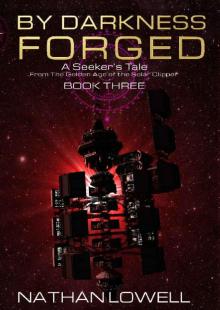 By Darkness Forged (Seeker's Tales from the Golden Age of the Solar Clipper Book 3)
By Darkness Forged (Seeker's Tales from the Golden Age of the Solar Clipper Book 3) The Wizard's Butler
The Wizard's Butler Cape Grace
Cape Grace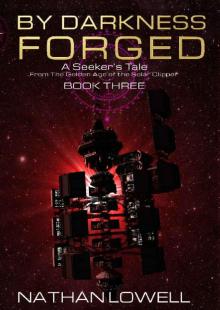 By Darkness Forged
By Darkness Forged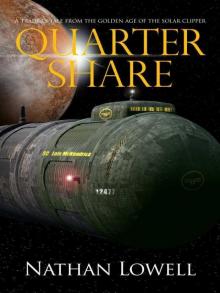 Quarter Share
Quarter Share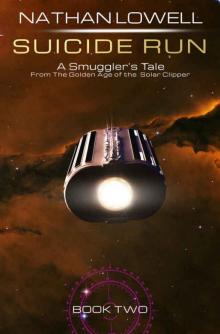 Suicide Run (Smuggler's Tales From the Golden Age of the Solar Clipper Book 2)
Suicide Run (Smuggler's Tales From the Golden Age of the Solar Clipper Book 2)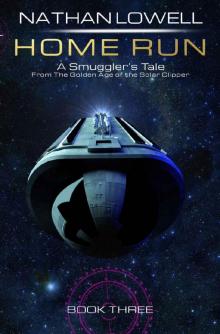 Home Run (Smuggler's Tales From the Golden Age of the Solar Clipper Book 3)
Home Run (Smuggler's Tales From the Golden Age of the Solar Clipper Book 3)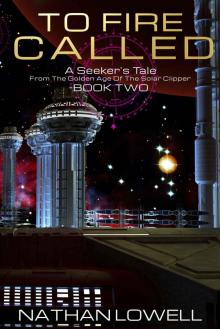 To Fire Called (A Seeker's Tale From The Golden Age Of The Solar Clipper Book 2)
To Fire Called (A Seeker's Tale From The Golden Age Of The Solar Clipper Book 2)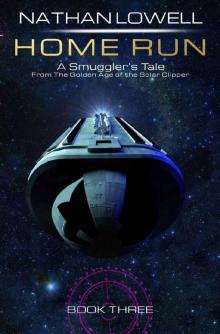 Home Run
Home Run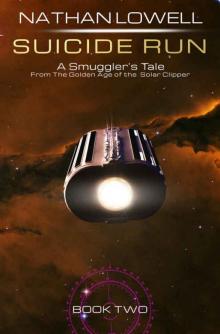 Suicide Run
Suicide Run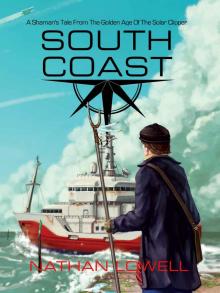 South Coast (Shaman's Tales From The Golden Age Of The Solar Clipper Book 1)
South Coast (Shaman's Tales From The Golden Age Of The Solar Clipper Book 1)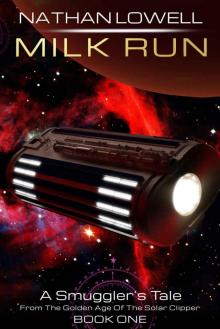 Milk Run (Smuggler's Tales From The Golden Age Of The Solar Clipper Book 1)
Milk Run (Smuggler's Tales From The Golden Age Of The Solar Clipper Book 1) Ravenwood (Tanyth Fairport Adventures)
Ravenwood (Tanyth Fairport Adventures) Captain's Share (Trader's Tales from the Golden Age of the Solar Clipper)
Captain's Share (Trader's Tales from the Golden Age of the Solar Clipper) Owner's Share (Trader's Tales from the Golden Age of the Solar Clipper)
Owner's Share (Trader's Tales from the Golden Age of the Solar Clipper)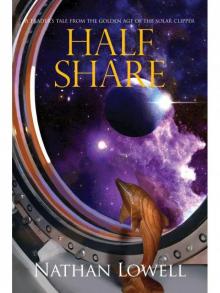 Half Share
Half Share The Hermit of Lammas Wood
The Hermit of Lammas Wood Ravenwood
Ravenwood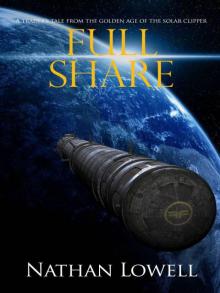 Full Share
Full Share A Light In The Dark (Tales of the Deep Dark)
A Light In The Dark (Tales of the Deep Dark)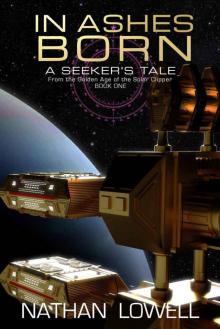 In Ashes Born (A Seeker's Tale From The Golden Age Of The Solar Clipper Book 1)
In Ashes Born (A Seeker's Tale From The Golden Age Of The Solar Clipper Book 1)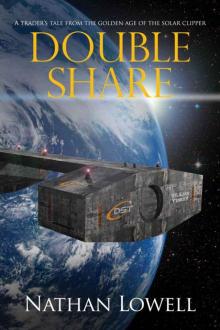 Double Share: Solar Clipper Trader Tales
Double Share: Solar Clipper Trader Tales Zypheria's Call (A Tanyth Fairport Adventure)
Zypheria's Call (A Tanyth Fairport Adventure)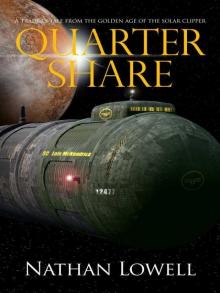 Quarter Share attftgaotsc-1
Quarter Share attftgaotsc-1